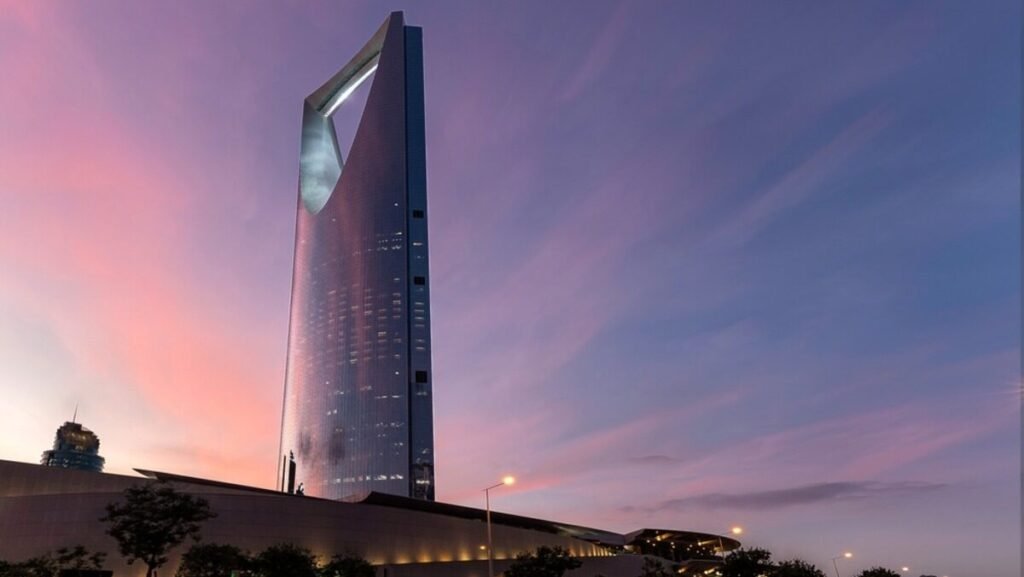Saudi Arabia’s non-oil private sector continued its steady expansion in May 2025, as shown by the Purchasing Managers’ Index (PMI) rising slightly from 55.6 in April to 55.8. This figure signals a positive economic environment outside the oil industry, which remains a key goal for the Kingdom’s Vision 2030 plan to diversify its economy.
The increase means that non-oil companies in Saudi Arabia are growing their output and hiring more workers, despite some ongoing challenges such as rising input costs. This steady growth reflects improved demand, stronger business confidence, and better supply chain conditions.
What is Saudi Arabia Non-Oil PMI and Why It Matters
The Purchasing Managers’ Index (PMI) is an important economic indicator that shows the health of the private sector. A PMI above 50 means the sector is expanding, while below 50 shows contraction.

Saudi Arabia’s non-oil PMI focuses on companies outside the oil industry, including construction, manufacturing, retail, services, and more. Because the Kingdom is trying to build a more diverse economy, this measure is key to understanding how well those sectors are performing.
The recent increase in the PMI suggests Saudi Arabia’s efforts to build a balanced economy are paying off. It also shows that businesses are more confident and optimistic about the future.

Strong Growth in New Orders and Output
One of the main reasons the PMI rose was due to a clear increase in new orders in May. Companies across various sectors reported more demand from customers both inside the Kingdom and internationally.
Businesses have been successful in marketing their products better and attracting more customers, thanks to increased consumer spending and government programs supporting private enterprises.
Because of higher demand, firms boosted their production levels to meet customer needs. This was particularly noticeable in construction, retail, and service industries, which have seen steady growth.
Construction Sector Driving Growth
The construction industry was a standout performer in May, showing significant growth. This sector benefits from huge infrastructure projects, real estate developments, and government spending on public works.
Projects such as new housing complexes, roads, and commercial buildings are creating many jobs and opportunities. The construction boom also helps related industries like transportation, equipment suppliers, and real estate services.
Companies in construction reported faster delivery times and more subcontracted work, speeding up project completion and improving productivity.
Job Creation Hits Highest Rate in Over a Decade
In May 2025, Saudi Arabia’s non-oil private sector saw the fastest rise in employment in more than 10 years. Companies are hiring more staff to cope with rising production and expanding business activities.
This increase in jobs is a positive sign for the Kingdom’s labor market. It supports national goals to provide more employment opportunities to Saudi citizens and reduce reliance on foreign workers.
Hiring also helps improve household incomes, which boosts consumer spending and supports the overall economy.
Business Confidence Reaches 18-Month High

Confidence among business leaders reached its highest point in a year and a half. Many business owners expressed optimism about the future, citing stronger demand, easier access to finance, and new investments in technology.
Companies are planning to expand operations, launch new products, and improve services. This positive outlook helps create a cycle of growth, as confident businesses are more likely to invest and hire.
Inflation and Cost Challenges Continue
Despite strong growth, many businesses face rising input costs. Prices for raw materials, transportation, and wages increased in May, putting pressure on company profits.
However, most firms chose to absorb these higher costs rather than pass them on to customers. This is especially true in the service sector, where companies sometimes lowered prices to stay competitive.
By controlling prices, businesses hope to keep loyal customers and maintain sales volumes, even when costs are rising.
Improved Supply Chains Support Growth
Supply chains showed improvement in May, with faster deliveries and better vendor performance. Many companies reported shorter waiting times for raw materials and goods needed for production.
This helped firms increase production and avoid delays in projects. Businesses also built up stocks in preparation for future demand.
Better supply chain management plays a key role in supporting Saudi Arabia’s private sector growth and overall economic health.
Government Support and Vision 2030 Impact
Saudi Arabia’s Vision 2030 plan aims to reduce the country’s dependence on oil and grow the private sector through reforms and investments. The rise in non-oil PMI confirms that these efforts are working.
The government has introduced reforms to encourage foreign investment, ease business regulations, and support sectors like tourism, entertainment, and technology.
Large national projects and international partnerships also boost private sector activity. These initiatives are expected to continue driving growth throughout 2025 and beyond.
Key Sectors to Watch in the Coming Months
Besides construction, other sectors such as retail, hospitality, and manufacturing are expected to keep expanding. Tourism and entertainment are also growing as Saudi Arabia opens up to more visitors and events.
Education and green energy are emerging as new growth areas, with increasing investments and strategic plans under Vision 2030.
Companies across these sectors are adopting new technologies and improving customer experiences to stay competitive.
What This Means for the Saudi Economy

The steady rise in Saudi Arabia’s non-oil PMI shows the Kingdom’s economy is becoming stronger and more diverse. Growth in private businesses means fewer risks from fluctuating oil prices and a more sustainable future.
More jobs, rising confidence, and increased production create a positive environment for long-term development. With continued government support and smart business strategies, the private sector is poised to play an even bigger role in Saudi Arabia’s economy.
Conclusion
Saudi Arabia Non-Oil PMI’s increase to 55.8 in May 2025 highlights strong growth and optimism in the country’s private sector. This growth is supported by rising new orders, job creation, and improved supply chains despite some cost pressures.
The construction sector leads the charge, followed by steady expansion in retail and services. Businesses are confident about future growth thanks to government reforms and investment in new technologies.
These positive trends align with Vision 2030, showing that Saudi Arabia’s plan to build a more diverse and resilient economy is on track. As the year continues, the non-oil private sector looks set to keep driving the Kingdom’s economic success.
Do follow UAE Stories on Instagram
Read More: Bahrain’s Big EV Push: Delivery Fleets Must Switch by 2027












